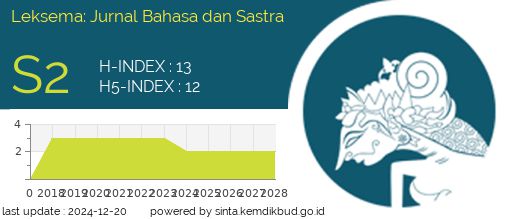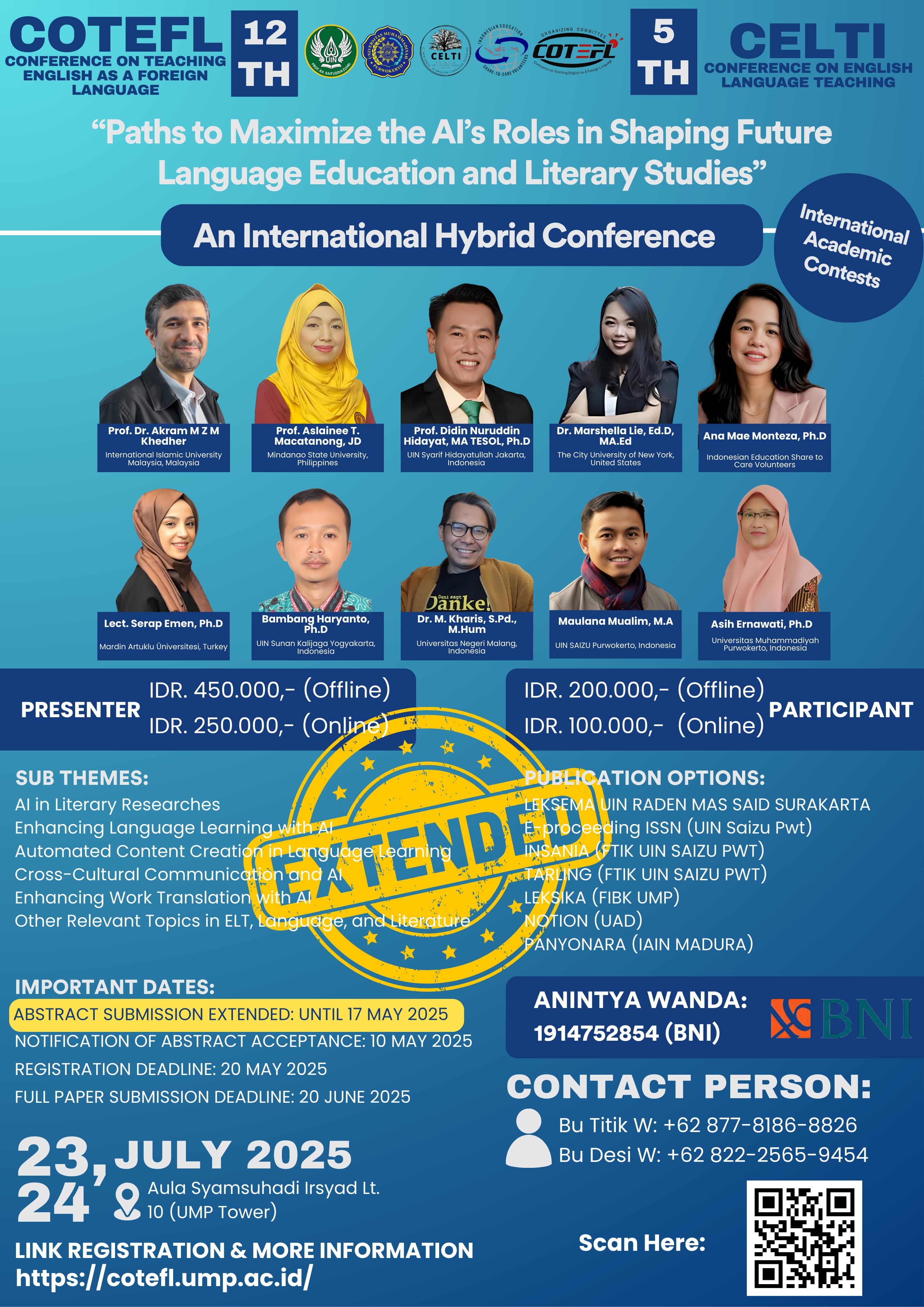BANYUMAS PROPER NAMES: STRUCTURE AND CULTURAL REFLECTION
DOI:
https://doi.org/10.22515/ljbs.v6i1.2441Keywords:
proper name, Banyumas, cultureAbstract
Proper name is a linguistic symbol that reflects people’s perspectives and thoughts over something. This study aims to reveal current naming convention in Banyumas from linguistic perspective and to describe naming classification which covers list of proper names, their sociocultural background, the meanings, and the functions. This study used descriptive-qualitative method with snowball technique for the sampling. Banyumas proper names are dominated by the use of monomorphemic form. The languages used to give proper names come from local language, Bahasa Indonesia, as well as foreign languages.The naming structure covers first name, functioning as gender and birth order markers; middle name, containing ethnical or foreign element; and last name, containing family name. Naming reference mostly uses adjectives, famous figures’ names, nature elements, flower names, puppet characters’ names, and/or numbers and symbols. Prefix su- also characterizes some proper names in Banyumas. Cultural reflection from Banyumas proper names is that the proper names chosen by the name givers, mostly parents, resemble their hope and prayer for their children. Proper name as a part of culture and folklore becomes ethnical identity for the people themselves.
Downloads
References
Anderson, James M. 2007. The Grammar of Names. Oxford: Oxford University Press. https://doi.org/10.1093/acprof:oso/9780199297412.001.0001
Bahiyah, Laila Nurul. 2016. Struktur Nama Serapan dari Bahasa Arab pada Masyarakat Jawa di Kabupaten Rembang Jawa Tengah: Kajian Etnolinguistik (Skripsi). Surabaya Airlangga University. http://repository.unair.ac.id/56092/
Chaer, Abdul. 2007. Kajian Bahasa: Struktur Internal, Pemakaian, dan Pemelajaran. Jakarta: Rineka Cipta
Chaer, Abdul & Leonie Agustina. 2004. Sosiolinguistik: Perkenalan Awal. Jakarta: Rineka Cipta
Danandjaja, James. 1994. Folklor Indonesia: Ilmu Gosip, Dongeng, dan lain lain. Jakarta: Grafiti Pers
Herusatoto, Budiono. 2008. Banyumas: Sejarah, Budaya, Bahasa, dan Watak. Yogyakarta: LKiS Pelangi Aksara
Irmayani. 2015. "Nama Marga Etnik Tionghoa sebagai Penanda Penetapan Keturunan dalam Sistem Kekerabatan Etnik Tionghoa di Pontianak". Metalingua: Jurnal Penelitian Bahasa 13 (1): 29-37. https://doi.org/10.26499/metalingua.v13i1.52
Kridalaksana, Harimurti. 2005. Kamus Linguistik. Jakarta: Gramedia Pustaka Utama
Liliweri, Alo. 2014. Pengantar Studi Kebudayaan. Yogyakarta: Nusa Media
Paryono, Yani. 2003. "Keunikan Bahasa Jawa Dialek Banyumas sebagai Cerminan Identitas Masyarakat Banyumas". Kongres Bahasa Jawa V. Surabaya. https://ki-demang.com/kbj5/index.php/makalah-pengombyong/1203-21-keunikan-bahasa-jawa-dialek-banyumas-sebagai-cerminan-identitas-masyarakat-banyumas/
Priyadi, Sugeng. 2008. "Orientasi Nilai Budaya Banyumas: Antara Masyarakat Tradisional dan Modern". Humaniora 20 (2): 158-167. https://doi.org/10.22146/jh.933
Sugiri, Eddy. 2003. "Perspektif Budaya Perubahan Nama Diri bagi WNI Keturunan Tionghoa di Wilayah Pemerintah Kota Surabaya". Bahasa dan Seni 31(1): 54-68
Sumarsono. 2014. Sosiolinguistik. Yogyakarta: Pustaka Pelajar
Sutanto, Irzanti. 2002. "Ganti Nama di Kalangan Keturunan Tionghoa Peraturan dan Kebebasan". Wacana 4(2):140-149. https://doi.org/10.17510/wjhi.v4i2.332
Trianton, Teguh. 2016. Bahasa sebagai Identitas dan Perlawanan Kultural Masyarakat Banyumas Pascakolonial [Preprint]. INA-Rxiv. https://doi.org/10.31227/osf.io/h8rsy
Van Langendonck, Willy. 2007. Theory and Typology of Proper Names. Berlin and New York: Mouton de Gruyter. https://doi.org/10.1515/LING.2009.042
Wibowo, Ridha Mashudi. 2001. "Nama Diri Etnik Jawa". Humaniora 13 (1), 45-55. https://doi.org/10.22146/jh.v13i1.710
Widodo, Sahid Teguh. 2013. "Konstruksi Nama Orang Jawa Studi Kasus Nama-nama Modern di Surakarta". Humaniora 25(1), 82-91. https://doi.org/10.22146/jh.v25i1.1815
Widodo, Sahid Teguh, Nuraini Yussof & Hisham Dzakiria. 2010. "Nama Orang Jawa: Kepelbagaian Unsur dan Maknanya". Sari: International Journal of the World and Civilisation 28 (2): 259-277
Downloads
Published
Issue
Section
License
The copyright of the received article shall be assigned to the publisher of the journal. The intended copyright includes the right to publish the article in various forms (including reprints). The journal maintains the publishing rights to published articles.
In line with the license, the authors and users (readers or other researchers) are allowed to share and adapt the material only for non-commercial purposes. In addition, the material must be given appropriate credit, provided with a link to the license, and indicated if changes were made. If authors remix, transform or build upon the material, authors must distribute their contributions under the same license as the original.







